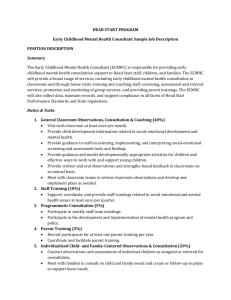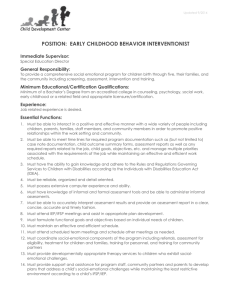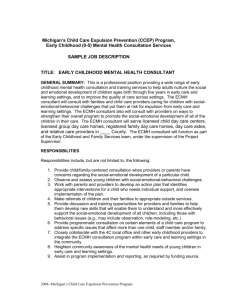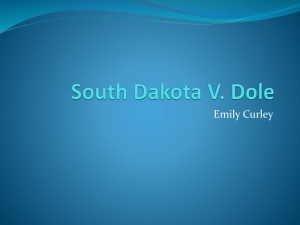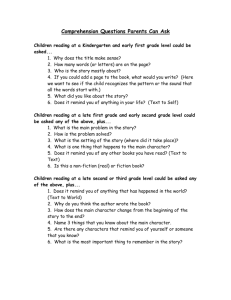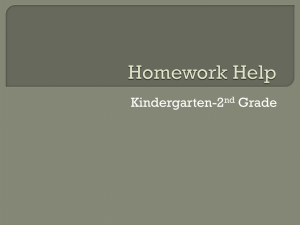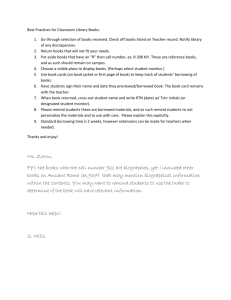Mental Health SDHSA Networking Report
advertisement
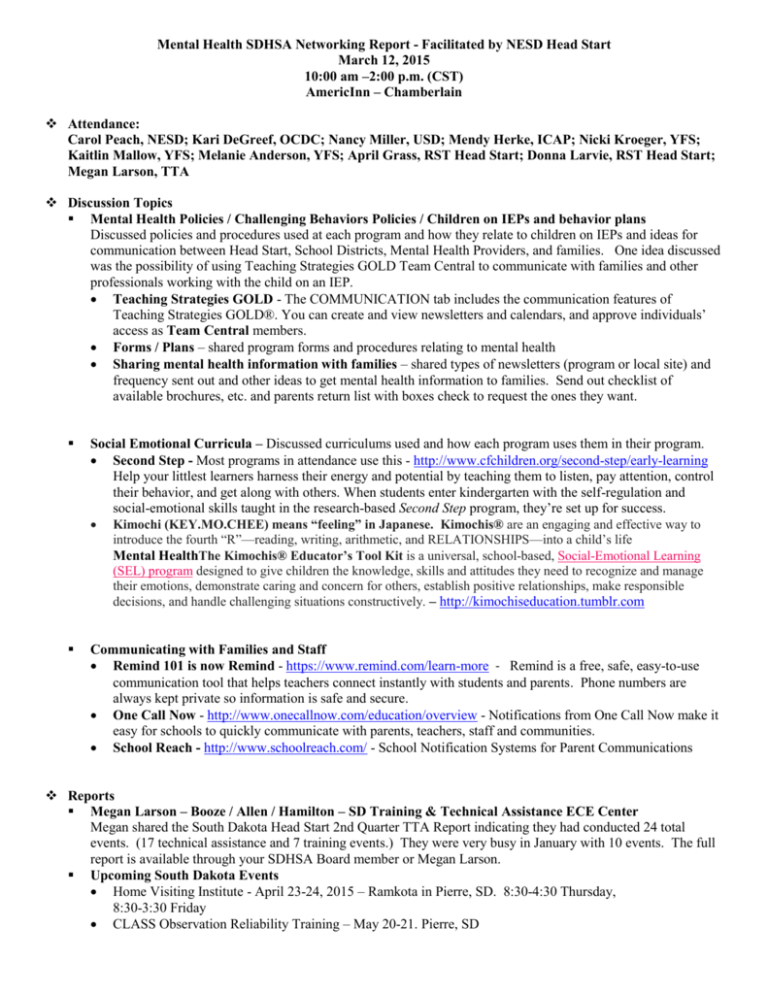
Mental Health SDHSA Networking Report - Facilitated by NESD Head Start March 12, 2015 10:00 am –2:00 p.m. (CST) AmericInn – Chamberlain Attendance: Carol Peach, NESD; Kari DeGreef, OCDC; Nancy Miller, USD; Mendy Herke, ICAP; Nicki Kroeger, YFS; Kaitlin Mallow, YFS; Melanie Anderson, YFS; April Grass, RST Head Start; Donna Larvie, RST Head Start; Megan Larson, TTA Discussion Topics Mental Health Policies / Challenging Behaviors Policies / Children on IEPs and behavior plans Discussed policies and procedures used at each program and how they relate to children on IEPs and ideas for communication between Head Start, School Districts, Mental Health Providers, and families. One idea discussed was the possibility of using Teaching Strategies GOLD Team Central to communicate with families and other professionals working with the child on an IEP. Teaching Strategies GOLD - The COMMUNICATION tab includes the communication features of Teaching Strategies GOLD®. You can create and view newsletters and calendars, and approve individuals’ access as Team Central members. Forms / Plans – shared program forms and procedures relating to mental health Sharing mental health information with families – shared types of newsletters (program or local site) and frequency sent out and other ideas to get mental health information to families. Send out checklist of available brochures, etc. and parents return list with boxes check to request the ones they want. Social Emotional Curricula – Discussed curriculums used and how each program uses them in their program. Second Step - Most programs in attendance use this - http://www.cfchildren.org/second-step/early-learning Help your littlest learners harness their energy and potential by teaching them to listen, pay attention, control their behavior, and get along with others. When students enter kindergarten with the self-regulation and social-emotional skills taught in the research-based Second Step program, they’re set up for success. Kimochi (KEY.MO.CHEE) means “feeling” in Japanese. Kimochis® are an engaging and effective way to introduce the fourth “R”—reading, writing, arithmetic, and RELATIONSHIPS—into a child’s life Mental HealthThe Kimochis® Educator’s Tool Kit is a universal, school-based, Social-Emotional Learning (SEL) program designed to give children the knowledge, skills and attitudes they need to recognize and manage their emotions, demonstrate caring and concern for others, establish positive relationships, make responsible decisions, and handle challenging situations constructively. – http://kimochiseducation.tumblr.com Communicating with Families and Staff Remind 101 is now Remind - https://www.remind.com/learn-more - Remind is a free, safe, easy-to-use communication tool that helps teachers connect instantly with students and parents. Phone numbers are always kept private so information is safe and secure. One Call Now - http://www.onecallnow.com/education/overview - Notifications from One Call Now make it easy for schools to quickly communicate with parents, teachers, staff and communities. School Reach - http://www.schoolreach.com/ - School Notification Systems for Parent Communications Reports Megan Larson – Booze / Allen / Hamilton – SD Training & Technical Assistance ECE Center Megan shared the South Dakota Head Start 2nd Quarter TTA Report indicating they had conducted 24 total events. (17 technical assistance and 7 training events.) They were very busy in January with 10 events. The full report is available through your SDHSA Board member or Megan Larson. Upcoming South Dakota Events Home Visiting Institute - April 23-24, 2015 – Ramkota in Pierre, SD. 8:30-4:30 Thursday, 8:30-3:30 Friday CLASS Observation Reliability Training – May 20-21. Pierre, SD Resources State Resources South Dakota Council of Mental Health Centers, Inc. http://www.sdmentalhealth.org/default.htm South Dakota Kids Mental Healthhttp://sdkidsmentalhealth.org/ National Alliance on Mental Illness http://www.nami.org/MSTemplate.cfm?Site=NAMI_South_Dakota Federal / National Resources Early Childhood Learning & Knowledge Center http://eclkc.ohs.acf.hhs.gov/hslc/tta-system/health/center/mental-health Center on the Social & Emotional Foundations for Early Learning http://csefel.vanderbilt.edu/ Center for Early Childhood Mental Health Consultation http://www.ecmhc.org/index.html In recent years, there has been growing concern among many in the early care and education (ECE) community that increasing numbers of very young children are manifesting behavior problems severe enough to warrant their removal from their preschool programs. Early childhood mental health consultation (ECMHC) is emerging as an effective strategy for addressing these challenging behaviors and supporting young children's social-emotional development in ECE settings. The tools and resources in this section may be used as a guide for program staff in designing and implementing effective mental health services for families. Early Childhood Mental Health Consultation – Material for Families Early Childhood Mental Health Consultation – An Evaluation Tool Kit Facilitating a Referral for Mental Health Services for Children and Their Families Within Early Head Start and Head Start Finding a Mental Health Provider for Children and Families in Your Early Head Start/Head Start Program What Works: A Study of Effective Mental Health Consultation Programs
